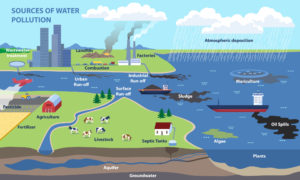Honoring Service Members and Their Families — Camp Lejeune Justice Act of 2022: Providing Help to Victims of Negligence

Sources of water pollution and freshwater contamination causes. Human economic activity as the main source of pollution. Educational banner. Flat cartoon vector illustration
Camp Lejeune, situated in Jacksonville, NC, was established in 1942 as a Marine Corps Base training facility. Now, Camp Lejeune is listed on the Superfund program’s National Priority List. The United States Agency for Toxic Substances & Disease Registry (ATSDR) declared that exposure to the drinking water at Camp Lejeune from August 1953 through February 1987 likely increased the risk of developing cancers, adverse birth outcomes, and other detrimental health effects of individuals situated on the base.
Based on estimates conducted by the ATSDR, by November 1957, water filtered through the Tarawa Terrace water treatment system on Camp Lejeune was thought to be contaminated. In 1980, military chemists began testing drinking water located on Camp Lejeune. Results began to finalize, displaying traces of tetrachloroethylene (PCE), trichloroethylene (TCE), vinal chloride, and other contaminants in two of the eight water treatment plants on base (Tarawa Terrace and Hadnot Point).
By 1985, the federal government closed the “most contaminated” wells on Camp Lejeune. It wasn’t until the end of 1987 that the water in Camp Lejeune was declared safe. It took 17 years after the Marine Corps discovered the contaminated water at Camp Lejeune to begin notifying former residents and service members that they may have been exposed to toxic chemicals. Hundreds of cases were centralized into a multidistrict litigation. Unfortunately, those lawsuits were dismissed due to North Carolina’s 10-year statute of repose. The court found that claimants had no later than 10 years to bring suit after the incident occurred.
Since then, years have been spent lobbying for a federal statute; specific in aiding victims who were exposed to contaminated water in Camp Lejeune. On September 24, 2020, the Camp Lejeune Justice Act was introduced to the senate as part of S.4716 with bipartisan support. It passed the House of Representatives as part of HR 3967: Honoring our PACT Act of 2022 on March 3, 2022 and passed the Senate on August 2, 2022.
Section 804 of the PACT Act is titled “Camp Lejeune Justice Act of 2022.” This act allows veterans, their family members, and others who were stationed, lived, or worked on the Marine Corps Base in Camp Lejeune, North Carolina to seek compensation in the next two years for injuries caused by exposure to contaminated water on the base, without fear of dismissal based on a statute of repose or other legal time bars to filing suit. Damage awards will be offset by amounts paid by Medicare, Supplemental Security Income, or Social Security Disability Insurance programs, or Veterans Affairs Disability programs. Full compensatory damages are available under the act, including:
- pain & suffering;
- loss of consortium;
- emotional damages; and
- wrongful death
Our attorneys look forward to filing claims for those exposed to the water at Camp Lejeune for 30 days or more between August 1, 1953, and December 31, 1987 and suffering from injuries including:
- Cancer
- ALS (Lou Gehrig’s Disease)
- Miscarriage
- Birth Defects
- Other Injuries
The Mass Tort attorneys at Searcy Denney Scarola Barnhart & Shipley stand ready to assist any of our brave veterans.
Share This


